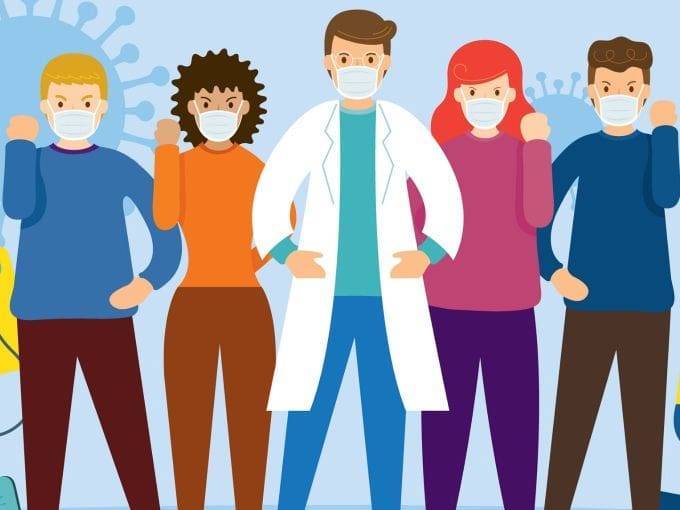Among the disruptions and pain caused by the Covid -19 pandemic many CEOs said that their major priority is the safety and well- being of their employees. They are doing many inspiring actions to encourage and support their employees. But now that we all know that this crisis is going to last more than a few weeks, companies are now defining their outlook in the long run.
During the Covid-19 crisis I think companies should consider the needs of their employees. Certainly security is necessary, but it is also important to pay attention to high- level needs, such as truth, stability, authentic relationships, self-esteem, development and crisis.
Many CEOs have started thinking about this crisis in three stages. They can specify different name or specific lengths for these phases, but they all map roughly to three different time horizons: the shelter-in-place phases, the re-opening phase, and the post Covid -19 stage. By following these ideas leaders can dynamically adjust and work more effectively and lead how they will take care of their employees though the unique challenges of each stage. The following is a discussion of how companies are and can meet the needs of workers at each stage.
In its first phase companies have sought to ensure the physical safety of their workers. They implement the work from home remedies and work in areas where work in areas where work is required, and the operating model has shifted- without thinking.
For example: Beyond security, they are also working to ensure safety. Many have worked to keep people on the payroll for as long as possible- even if that is the necessary furlough – and increased pay for front-line workers. Some have set up an employee relief fund to meet immediate needs. In some companies, senior executives and boards of directors cut salaries; many people have provided back-up childcare solution and have given their workers time to care for loved ones.
Ever above the chain of needs, they are working hard to make connections and support the mental health of their workers. They have approached their employees in ongoing, consistent, transparent and honest ways, seeking an approach with a human touch – using videos rather than just written communication, setting up office hours, a regular coffee establishing time or happy hours, and providing direct access for leaders and allies. Crucially, some companies have put mental health support options for leaders and employees, including yoga and meditation sessions, to help employees, navigate through these unprecedented times in order to keep employees at certain level.
Often during a crisis, we always think that we have superheroes leaders, they removes us from the crisis in troubled times. Of course, we need such leaders who are great analytical and problem- solving minds, leaders who are great at making decision. But we also need such leaders who can demonstrate vulnerability and empathy. It’s interesting to see that many countries that are going through this crisis most effectively and there are all women –led and their leaders combine a science- based approach with a more human touch.
Even now at this asylum stage, I see many companies making sure that the actions they take connect to the company’s purpose. Many companies are mobilizing their resources in support of the community in a way that it tied to their purpose, even if it is not completely clear beforehand.
Carefully, but hopefully, many companies started making plans to reopen their companies- a process we now know will likely be long and drawn out. As they are prepare themselves for the next phase, they must continues to consider their broad spectrum of employees; Needs, beyond just creating a physically safe workplace.
Companies are taking some measures which help them to fight with such crisis like Covid- 19
• They are defining the terms that will ensure the safe reopening of their operations from door-to –door services to offices and stores.
• Bringing more and more people back. Companies will definitely need to decide how many employees they are able to recall and how will they communicate with other employees.
• Recognizing that the world is changing, encouraging the organization to simply “restart” vs. just “restart” and highlight that some things are not changing such as the company’s main focus and value.
• Highlighting how the company’s activities contribute to the common good and are making a difference in people’s lives.
• A deeper understanding of workers’ needs, even individuals, beyond just safety will make will make for a better re- opening phase.
There will be some time till we reach this stage, but companies are beginning to consider it and prepare for it. For some companies, like for those in the travel sector, this can be a challenging phase as the ability to dramatically impact some business from declining consumer demand can turn into significant revenue, cost and headcount reductions.
As companies begin working to invent a future that does not yet exist, they will be wise to increase their employees’ understanding and sense of business as input to their planning process.
As a final consideration for this phase, being connected with fake employees will allow companies to re- employ these employees as new job opportunities, which are either based on growth or turnover.
It is now to be seen how companies and leaders overcome this crisis time and deal with all their stakeholders – starting with the full range of their employees and their needs. Which contribute to the next level attachments (or not) to the company in the future and to the company’s ability to get out of the crisis.
Authored by-

